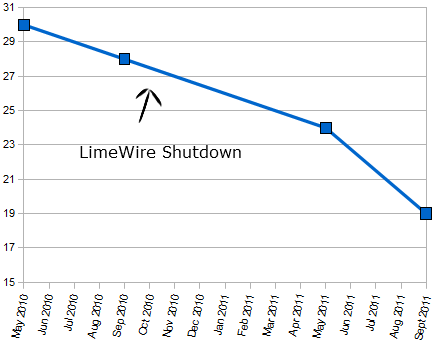TorrentFreak Email Update |
| RIAA: Innovation is the Best Way to Kill Piracy Posted: 12 Apr 2012 02:26 PM PDT
Today the RIAA takes this notion back. “The single most important anti-piracy strategy remains innovation, experimentation and working with our technology partners to offer fans an array of legal music experiences,” they now say. The usage of the word “remains” is remarkable, since to our knowledge this is the first time the RIAA has admitted that innovation is more important than enforcement. But let’s not dwell on that for too long. While the RIAA’s statement can be seen as a victory for those who in recent years spread the “innovate not legislate” mantra, it is tucked away in an article that spreads dubious claims and statistics on the effectiveness of copyright enforcement. RIAA Vice President of Strategic Data Analysis, Joshua Friedlander, begins as follows: “Although the impact of anti-piracy efforts often seem self evident to us, it's important to see the real world effects, and we're happy to see two new studies illustrating the value of these efforts in the marketplace.” The first study highlighted by the RIAA shows that the French anti-piracy law Hadopi boosted iTunes sales. A highly controversial report, as the main conclusion is that the media buzz a year before the law went into effect was the single cause for this jump. No third variables are seriously considered, and the authors fail to mention that digital sales actually went down in 2011, the first full year Hadopi was active. More on this in our full analysis of the report. The second “study” isn’t really a study, but an attempt by the RIAA itself to show how effective the LimeWire shutdown was. Using Nielsen Netview data the music group reveals that 9.5 million of the 14 million people who used LimeWire shortly before the shutdown, stopped pirating entirely. This also had a significant impact on the total number of US file-sharers. “The Limewire shutdown affected the overall numbers of users of illegal content sources. The overall number of U.S. users of the illegal sites in September 2010 was 28 million, but that fell to 19 million by September 2011,” the RIAA writes. In other words, the total number of US file-sharers dropped 9 million a year after the LimeWire shutdown (which is +0.5 million if we discount the LimeWire users). So far so good, but what the RIAA fails to point out is that there’s absolutely no evidence that the drop is related to the LimeWire shutdown. We doubt it, and also have some numbers to show that RIAA’s conclusion may be completely bogus. Let’s add two more data points that former RIAA boss Mitch Bainwol shared last year. “The number of Americans engaged in illegal music consumption fell from roughly 30 million in May of 2010 to about 24 million in May of this year,” he said. Combining the four points, we see that during the 4 months prior to the LimeWire shutdown the number of music pirates decreased by 0.5 million a month. The 8 months after the LimeWire shutdown this average is exactly the same, 0.5 million a month. Interestingly, there is a larger drop between May 2011 and September 2011, a decrease of more than 1 million music pirates a month. Surely, that can no longer be a LimeWire effect?  What it is, we don’t know, but something happened last summer around the same time Spotify was introduced in the US……. And that brings us back to the innovation part. After all, we now agree with the RIAA that innovation is the best way to kill piracy – creative statistics and overbroad censorship clearly aren’t. Source: RIAA: Innovation is the Best Way to Kill Piracy |
| US Govt. Objects To Megaupload Hiring Top Law Firm Posted: 12 Apr 2012 05:38 AM PDT
Initially a law firm called Sidley Austin LLP had been negotiating on Megaupload’s behalf for the return of such assets and funds held in Hong Kong, New Zealand and Canada. Funds were indeed released from Hong Kong in February (to pay Mega employees) and from New Zealand in March (to pay for Kim Dotcom’s living expenses). At the end of last month, Sidley Austin LLP and Rothken law firm filed a motion in the US to have more funds released to cover Mega’s legal fees. Later Sidley Austin withdrew and a new law firm called Quinn Emanuel Urguhart & Sullivan took their place. The addition of the Los Angeles-based company to Megaupload’s legal team was widely considered a great asset for Kim Dotcom and his co-defendants to exploit. Andrew Schapiro, a partner at Quinn Emanuel, had previously represented several technology and media companies including Google and YouTube, leading the latter to a summary judgment in its $1 billion lawsuit against Viacom.
The government says the first conflict concerns YouTube. Last week the U.S. Court of Appeals in Manhattan reversed a lower court's decision to issue summary judgment in the Viacom v YouTube case, so now that battle is back on. YouTube is also listed as a victim and potential witness in the criminal indictment against Megaupload. Quinn Emanuel can’t have interest in both cases, the government says. The second claimed conflict concerns Google, a company represented by Quinn Emanuel on a number of occasions including some involving the company’s AdSense advertising service. According to the Megaupload indictment, Google withdrew its Adsense service from the now-defunct file-hosting service in part due to copyright infringement concerns. The government intends to call Google as a witness in the Megaupload case. But it doesn’t stop there. The government goes on to list several companies that have been represented by Quinn Emanuel in copyright matters who are also alleged victims in the Megaupload case and who could be called as witnesses. The list includes a who’s-who of Hollywood and TV companies including Disney, Fox, Time Warner, Warner Bros. and HBO, in cases dating between 2006 and 2009. Another, a trademark dispute involving the company Danjaq LLC (holder of copyrights and trademarks relating to James Bond) and Sony dates back to 1998. Software companies make an appearance too. Quinn Emanuel represented Brøderbund Software back in 1986, Intuit (the company behind Quicken) in 1997, and at some point Bulletproof Software. It is claimed that all of these companies had their products distributed unlawfully via Megaupload and could be called to give testimony. “It is unclear how Quinn Emanuel intends to zealously represent defendants Megaupload Limited and Kim Dotcom while also protecting confidential attorney-client information gained in the course of representing other clients [...] particularly where those clients' interests are directly opposed to those of the defendants,” the government writes. But according to the government the conflicts go even deeper, particularly since Quinn Emanuel are now applying for funds seized from Megaupload to be released in order to pay legal fees. “The possibility of a conflict of interest raised by Quinn Emanuel's proposed representation of Megaupload Limited and Kim Dotcom is not limited to mere subject matter. The assets seized by the government from defendants may eventually be restored to victims – including possibly the current and former Quinn Emanuel clients listed above – as restitution,” the government adds. In any event, the US government believes that the amount of money already released by New Zealand to Kim Dotcom ($240,000 to be released in monthly installments of $32,000 until the funds are depleted then indefinite monthly payments of $16,000) will not prove restrictive when it comes to hiring a “competent” legal team, “..even if such funds prove insufficient to pay Quinn Emanuel's billing rates.” The government’s complaints pose a real problem for Megaupload. Will it ever be possible for Kim Dotcom and his co-defendants to recruit a high-quality copyright specialist law firm that hasn’t ever represented any of the potential witnesses in the case? It seems unlikely. Meanwhile, the fight for legitimate users of Megaupload to get their data back continues. “The Electronic Frontier Foundation (EFF) will ask a federal judge on Friday to establish a process that would allow lawful users of Megaupload’s cloud storage service to get their files back,” the EFF reports. Source: US Govt. Objects To Megaupload Hiring Top Law Firm |
| You are subscribed to email updates from TorrentFreak To stop receiving these emails, you may unsubscribe now. | Email delivery powered by Google |
| Google Inc., 20 West Kinzie, Chicago IL USA 60610 | |


 For years, when people suggested that the labels should adapt their business models to the digital age and compete with piracy, the RIAA claimed that it’s impossible to compete with free.
For years, when people suggested that the labels should adapt their business models to the digital age and compete with piracy, the RIAA claimed that it’s impossible to compete with free.


 Following the raids on Megaupload in January, tens of millions of dollars in assets and funds belonging to the company were seized.
Following the raids on Megaupload in January, tens of millions of dollars in assets and funds belonging to the company were seized. In a new court filing the US government complains that Schapiro’s past record in copyright cases, and that of Quinn Emanuel as a whole, present a series of conflicts of interest.
In a new court filing the US government complains that Schapiro’s past record in copyright cases, and that of Quinn Emanuel as a whole, present a series of conflicts of interest.
No comments:
Post a Comment